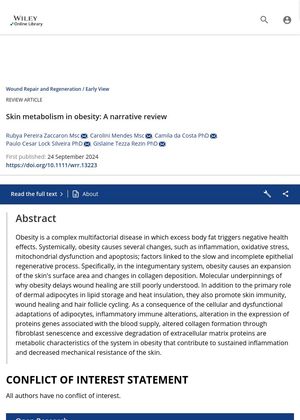Skin metabolism in obesity: A narrative review
September 2024
in “
Wound Repair and Regeneration
”

TLDR Obesity harms skin health by causing inflammation and delayed wound healing.
Obesity is a complex disease that negatively impacts health by causing systemic changes such as inflammation, oxidative stress, mitochondrial dysfunction, and apoptosis, which are linked to slow and incomplete epithelial regeneration. In the skin, obesity leads to an increased surface area and altered collagen deposition. The molecular reasons for delayed wound healing in obesity are not well understood. Dermal adipocytes, beyond storing lipids and insulating heat, play roles in skin immunity, wound healing, and hair follicle cycling. Obesity-related cellular and dysfunctional adaptations of adipocytes result in inflammatory immune changes, altered protein gene expression affecting blood supply, fibroblast senescence, and excessive extracellular matrix protein degradation, contributing to sustained inflammation and reduced skin mechanical resistance.

